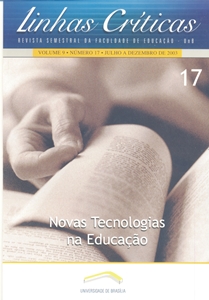Proformação: uma análise da influência do Banco Mundial na formação dos professores leigos
DOI:
https://doi.org/10.26512/lc.v9i17.3180Keywords:
Política de formação dos professores;, EAD;, Banco Mundial;, Formação dos professores;, Novas tecnologias da informação;, Comunicação e formação de professoresAbstract
O Proformação é um dos programas criados pelo Governo de Fernando Henrique Cardoso (1995-2002). Seu objetivo é a formação do professor leigo em Magistério de nível médio que já atua nas quatro primeiras séries do ensino fundamental e nas classes de alfabetização e pré-escola, nas regiões Norte, Nordeste e Centro-Oeste do Brasil. É financiado pelo Fundescola e pelo Banco Mundial. Com a duração de dois anos, combina a tecnologia de educação a distância com partes presenciais, quando os participantes têm aulas nas agências formadoras ”” antigas escolas normais ”” e são acompanhados por tutores do programa, estudam em livros especiais e assistem à TV Escola. O artigo articula as orientações das políticas do Banco Mundial e o Proformação, sinalizando alguns problemas existentes nessa influência.
Downloads
Downloads
Published
How to Cite
Issue
Section
License
Copyright (c) 2016 Linhas Críticas

This work is licensed under a Creative Commons Attribution 4.0 International License.
Authors who publish in this journal agree to the following terms:
-Authors maintains the copyright and grants the journal the right of first publication, the work being simultaneously licensed under the Creative Commons Attribution License which allows the sharing of the work with recognition of the authorship of the work and initial publication in this journal.
- Authors are authorized to enter into additional contracts separately, for non-exclusive distribution of the version of the work published in this journal (eg publish in institutional repository or as a book chapter), with acknowledgment of authorship and initial publication in this journal.
-Authorers are allowed and encouraged to publish and distribute their work online (eg in institutional repositories or on their personal page) at any point before or during the editorial process, as this can generate productive changes as well as increase the impact and the citation of published work (See The Effect of Free Access).



